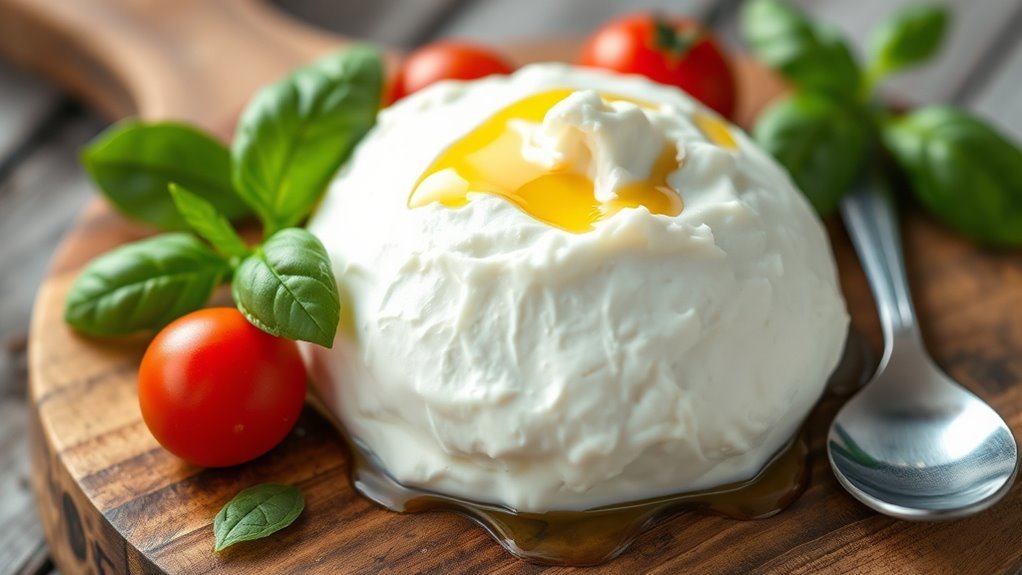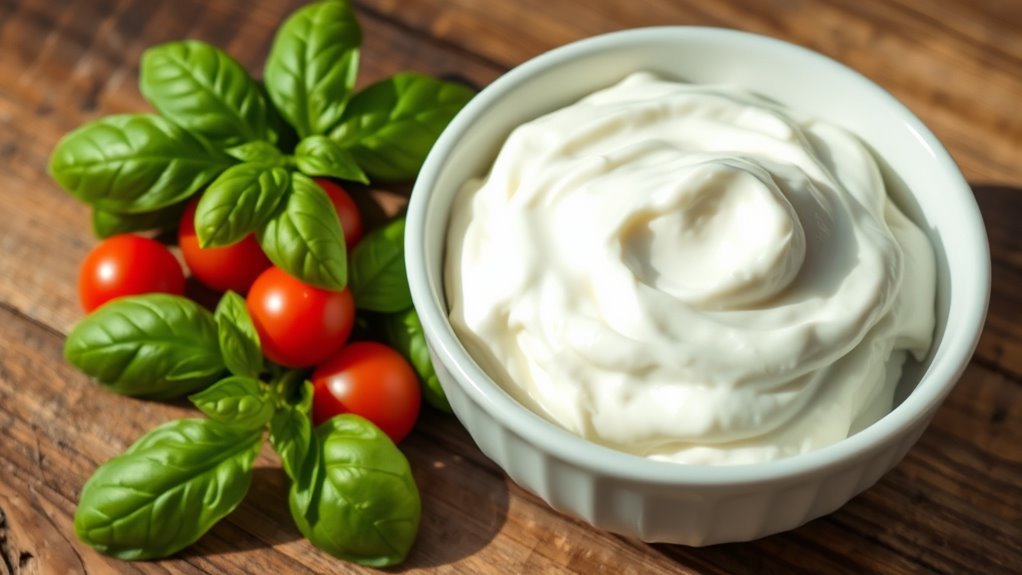Yes, ricotta cheese is keto-friendly due to its low carbohydrate content and high protein levels. A half-cup serving typically contains around 6 grams of carbs, making it easy to fit into your daily limits. It’s rich in healthy fats, which help with satiety and energy. Furthermore, ricotta offers essential nutrients like calcium and vitamin A. If you’re looking for creative ways to incorporate ricotta into your meals, you’ll find plenty of options that suit a keto lifestyle.
Nutritional Profile of Ricotta Cheese

Ricotta cheese is a versatile dairy product that offers a unique nutritional profile, making it a popular choice among various diets. It comes in several ricotta varieties, each differing in fat content and texture, which can cater to your specific dietary needs. For instance, part-skim ricotta provides a lower-fat option while maintaining essential protein levels. When it comes to ricotta storage, keeping it sealed and refrigerated is essential for preserving its freshness and flavor. Typically, ricotta can last about a week after opening, so it’s wise to monitor its condition. By understanding these factors, you can make informed decisions about incorporating ricotta into your meals, ensuring you enjoy its benefits without compromising your dietary goals.
Carbohydrate Content in Ricotta Cheese

When considering ricotta cheese in a keto diet, it’s essential to examine its carbohydrate content. Ricotta typically contains around 6 grams of carbs per half-cup serving, which may impact your daily carb limits. Comparing this to other cheese options can help you determine if ricotta fits into your low-carb lifestyle.
Nutritional Breakdown of Ricotta
Cheese lovers often turn to ricotta for its creamy texture and versatility in various dishes. When analyzing the nutritional values, ricotta stands out among cheese varieties due to its unique composition. A half-cup serving typically contains around 14 grams of carbohydrates, which can be a consideration for those following a keto diet. However, it also offers essential nutrients like protein and calcium, making it a nutritious option for many. The balance of fat and protein in ricotta contributes to its creamy mouthfeel, enhancing its appeal in both savory and sweet recipes. Understanding the nutritional breakdown of ricotta helps you make informed choices about incorporating it into your meals while considering your dietary preferences and goals. Additionally, low carbohydrate content allows for occasional use in moderation without significantly impacting your daily carb intake.
Carb Count Comparison
For those closely monitoring their carbohydrate intake, understanding the carb count in ricotta cheese is essential. Ricotta varieties can differ markedly in their carbohydrate content. On average, one cup of whole milk ricotta contains around 6-8 grams of carbs. In comparison, part-skim ricotta typically has a similar carb count but offers a lower fat option. When making cheese comparisons, it’s important to reflect on how these differences affect your overall keto diet. While ricotta can fit into a low-carb lifestyle, portion control is critical. Always check labels, since some brands may have additives that increase carb counts. By being mindful of these factors, you can enjoy ricotta without derailing your dietary goals.
Health Benefits of Ricotta Cheese on a Keto Diet

Although many dairy products can be high in carbohydrates, ricotta cheese stands out as a versatile option that fits well within the parameters of a keto diet. Its unique composition offers several health benefits that can enhance your keto experience:
- Protein-rich: Supports muscle maintenance and growth.
- Low in carbohydrates: Helps you stay within your daily carb limit.
- Calcium source: Promotes strong bones and teeth.
- Contains healthy fats: Aids in satiety and energy.
- Versatile: Can be used in both sweet and savory dishes.
Incorporating ricotta cheese into your meals can help you enjoy a flavorful, satisfying diet while reaping these health benefits. Embracing ricotta allows you to maximize your keto journey without sacrificing taste or nutrition.
How to Incorporate Ricotta Cheese Into Keto Meals
Incorporating ricotta cheese into your keto meals can enhance both flavor and texture. You can explore its versatility in breakfast dishes, savory pasta alternatives, and even healthy dessert recipes. Each option allows you to enjoy the creamy richness of ricotta while staying within your carb limits.
Ricotta in Breakfast Dishes
While many might overlook ricotta cheese as a breakfast option, it can actually serve as a versatile ingredient in keto meals. You can enjoy ricotta in various delicious ways that align with your dietary goals. Consider these ideas to elevate your breakfast:
- Ricotta pancakes: Creamy and low-carb, they’ll satisfy your sweet tooth.
- Ricotta omelets: Add a protein boost while keeping it rich and filling.
- Fruit parfaits: Layer ricotta with berries for a revitalizing start.
- Savory spreads: Mix herbs and spices for a delightful toast topping.
- Smoothies: Blend with almond milk for a creamy texture.
Incorporating ricotta into your breakfast can enhance flavor and keep you energized throughout the day while staying true to your keto lifestyle.
Savory Ricotta Pasta Alternatives
When you’re looking for hearty, low-carb meals, ricotta cheese can be a game changer in creating flavorful pasta alternatives that fit your keto lifestyle. You can use ricotta as a base for savory alternatives like stuffed zucchini boats or eggplant lasagna, where it adds creaminess without the carbs. Pair it with spiralized vegetables, such as zucchini or spaghetti squash, to create satisfying pasta substitutes. Mixing ricotta with herbs, garlic, and spinach can elevate your dishes, providing not just flavor but essential nutrients. Additionally, blending it into sauces can enhance texture while keeping your meals keto-friendly. By incorporating ricotta cheese thoughtfully, you can enjoy a variety of delicious, low-carb pasta dishes that satisfy your cravings.
Healthy Ricotta Desserts Recipes
Ricotta cheese isn’t just a savory ingredient; it also shines in the domain of desserts, making it a versatile choice for keto-friendly recipes. You can create delightful treats that satisfy your sweet cravings without breaking your diet. Consider these options:
- Creamy ricotta cheesecake, rich in flavor and low in carbs
- Light and airy ricotta mousse, perfect for a quick indulgence
- Ricotta-stuffed strawberries for a revitalizing twist
- Chocolate ricotta parfaits that deliver a sweet, guilt-free experience
- Ricotta pancakes topped with berries for a brunch favorite
Incorporating ricotta into these desserts not only enhances texture but also boosts protein content, allowing you to enjoy delicious meals while staying true to your keto lifestyle.
Recipes Featuring Ricotta Cheese for Keto Enthusiasts
If you’re looking to incorporate ricotta cheese into your keto diet, you’ll find it offers a versatile base for a variety of delicious recipes. For savory dishes, consider creating a rich ricotta sauce to serve over zoodles or cauliflower rice. Pair it with fresh herbs and garlic for added flavor. You can also mix ricotta with spinach and use it as a filling for keto-friendly stuffed peppers. For a sweet option, blend ricotta with vanilla extract and serve it with berries for a low-carb dessert. Experiment with different ricotta pairings, like nuts or seeds, to enhance texture and taste. These recipes highlight ricotta’s adaptability, making it a valuable ingredient for any keto enthusiast.
Alternatives to Ricotta Cheese on a Keto Diet
What options do you have when ricotta cheese doesn’t fit into your keto meal plan? Fortunately, there are several ricotta substitutes and dairy alternatives that can seamlessly integrate into your diet. Here are some options to reflect upon:
When ricotta cheese isn’t suitable for your keto diet, explore delicious substitute options that keep your meals flavorful and satisfying.
- Cream cheese: Rich and creamy, it works well in many recipes.
- Mascarpone: A deliciously smooth option, perfect for desserts.
- Cottage cheese: Lower in fat, but still offers a similar texture.
- Greek yogurt: Adds a tangy flavor while being high in protein.
- Silken tofu: A great dairy-free alternative that blends well in various dishes.
Additionally, cottage cheese’s low carb content fits perfectly into a keto diet, allowing you to enjoy a versatile ingredient without compromising your goals. These alternatives not only maintain your keto lifestyle but also allow you to explore new flavors and textures without feeling restricted.
Frequently Asked Questions
Can Ricotta Cheese Be Eaten Raw on a Keto Diet?
Yes, you can eat ricotta cheese raw on a keto diet. It’s versatile and can be incorporated into various keto recipes, adding a creamy texture without high carbs. Raw consumption of ricotta is safe, provided it’s fresh and from a reputable source. Just be mindful of portion sizes to maintain your carb limits. Enjoy it on its own, or mix with low-carb ingredients for delicious, satisfying meals while sticking to your dietary goals.
Is Ricotta Cheese Suitable for Lactose-Intolerant Individuals?
Ricotta cheese might not be suitable for you if you’re lactose intolerant, as it can cause lactose intolerance symptoms like bloating or diarrhea. However, some people with mild lactose intolerance can tolerate small amounts. If you’re looking for ricotta cheese alternatives, consider using dairy-free options like almond or cashew cheese, which can provide a similar texture without the lactose. Always check product labels to guarantee they meet your dietary needs.
How Does Ricotta Cheese Compare to Cream Cheese for Keto?
When comparing ricotta cheese to cream cheese for keto, both have their merits. Cream cheese benefits include a higher fat content, making it a great option for those prioritizing fat intake. Ricotta cheese uses are versatile, offering a lighter texture and slightly lower calories. If you’re aiming for a more balanced macros approach, ricotta might be preferable, while cream cheese can help boost your fat intake effectively. Consider your dietary goals when choosing.
What Is the Shelf Life of Ricotta Cheese?
Ricotta cheese typically lasts about one week after opening, while unopened, it can stay fresh for up to a month in the fridge. However, storing it properly is essential; keeping it sealed and in its original container helps maintain ricotta’s freshness. You’ll want to check for any signs of spoilage, like off smells or mold, before using. Balancing freshness and shelf life can guarantee you enjoy ricotta at its best.
Can Ricotta Cheese Cause Weight Gain on a Keto Diet?
Ricotta cheese can potentially contribute to weight gain on a keto diet if you don’t practice portion control. Its caloric content is relatively high, and consuming it in large amounts can lead to an excess of calories. However, when enjoyed in moderation, it can be a delicious addition to your meals without derailing your diet. Just keep an eye on your overall intake and balance it with your daily caloric goals.
References
- https://www.healthline.com/nutrition/ricotta-cheese-keto-friendly
- https://www.verywellfit.com/is-ricotta-cheese-keto-friendly-5117076
- https://www.ncbi.nlm.nih.gov/pmc/articles/PMC5372970/
- https://www.dietdoctor.com/low-carb/food/ricotta-cheese
- https://www.medicalnewstoday.com/articles/ricotta-cheese-nutrition
- https://www.wisewell.com/blogs/health/what-is-ricotta-cheese-nutrition-facts-and-health-benefits
- https://www.ketodietapp.com/Blog/post/2020/01/06/Is-Ricotta-Cheese-Keto
- https://www.clevelandclinic.org/health/articles/what-is-ricotta-cheese
- https://www.health.harvard.edu/staying-healthy/the-health-benefits-of-dairy-products


